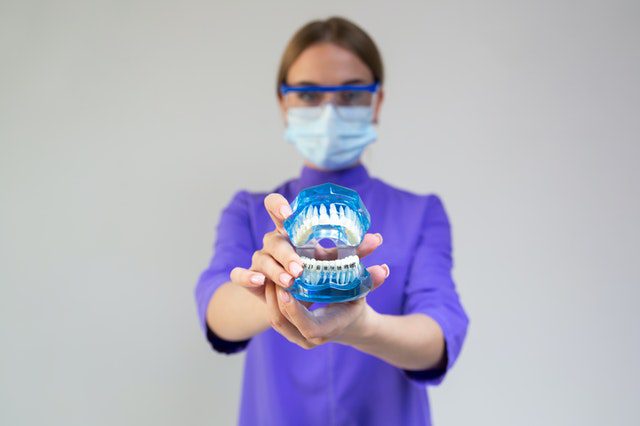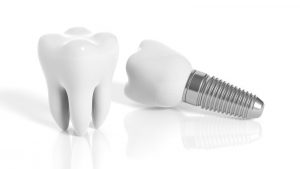Smiles are important in US culture – if life, love, work – everywhere. So when you lose a tooth, it can naturally take a toll on how you feel about yourself, not to mention how others perceive you. It can also make eating, speaking and even breathing more difficult, and puts the rest of your bite at risk, as well.
The ironic thing about this is that millions upon millions of people in the US are missing at least one tooth – roughly 120 million. There are several ways to replace a tooth, but among them, dental implant surgery offers the most benefits. And luckily, there are different types of dental implants that allow patients across a spectrum of health to get dental implants.
What are Cosmetic Dental Implants?
Cosmetic dental implants are one of the best solutions for tooth loss because it’s as close as you can get to a natural tooth. And unlike other methods of tooth replacement, cosmetic dental implants aren’t just cosmetic; they replace the lost tooth’s appearance as well as its biological functions.
The difference between dental implants and other mouth reconstruction methods like dentures and bridges is what’s going on under the gums. Dentures and bridges provide replacement crowns, restoring the mechanical function of teeth. But the implant post in a prosthetic tooth replaces the biological function of a tooth as well, which is why they’re preferred.
What Are the Benefits of Dental Implants?
Your jaw requires stimulation to remain strong and healthy. When you lose a tooth, that stimulation goes away, and the jaw starts to deteriorate at that spot. This poses several risks to the rest of your mouth, including bite alignment, tooth decay, teeth shifting, and even additional tooth loss. A dental implant prevents that deterioration process by stimulating the jaw at the site of the missing tooth.
Aside from preserving the health of your jaw and the integrity of your bite, dental implants offer additional advantages:
- The only permanent method of reconstructing a smile
- Holistic tooth replacement
- Restored appearance
- Improved self esteem
- Restored function
- Same bite strength as natural tooth
The 3 Parts of Cosmetic Dental Implants
There are 3 distinct parts of a dental implant: the crown, the abutment, and the fixture.
- The crown is the artificial tooth itself, typically made of porcelain or out of a combination of porcelain with metal, porcelain or zirconia. We offer the option of zirconia dental implants, in which the entire tooth – root and crown – is made of ceramic.
- The abutment is typically made of titanium or white zirconia. It’s the piece that connects the crown with the implant fixture, held in place with a screw.
- The fixture, or actual implant, is the part that is surgically installed into the jawbone. It’s usually made of titanium. Titanium is very biocompatible, and healthy bone tissue doesn’t have an issue growing around it and integrating the implant with the natural jaw bone material. We also offer ceramic, or zirconia (sometimes mistakenly called zirconium) dental implants. Cosmetic zirconia implants are great for people with metal allergies, but they’re a bit more likely to break or become loose than their titanium counterparts.
The 4 Types of Cosmetic Dental Implants
There are several kinds of cosmetic and restorative dental implant solutions that allow patients of different jaw health to be able to take an implant properly.
- Same-Day Dental Implants for Patients with Great Oral Health
As the name implies, single-stage dental implants (also known as same-day dental implants) can usually be completed in a single session. It’s a procedure Dr. Puckett is quite fond of, because it gets you in and out quickly with less hassle.
We first place a longer implant into your jaw so it’s on the jaw bone, with the top of the implant level with the gum tissue. We then stitch and close the gum tissue with the head of the implant still visible. Months later into the healing process, we attach the implant to the exposed head without the need for additional surgery.
The beauty of same-day dental implants is they can be completed in one appointment. This means fewer commutes back and forth to our office — a great convenience if you live in Cincinnati or surrounding areas. However, this type of dental implant can only work for patients with sufficient jaw health.
- Two-Stage Dental Implants for Standard Tooth Replacement
The two-stage dental implant requires two surgical procedures to set in place. The first places the implant into the jaw bone, which is then stitched shut. Once that has healed after several months, we do a second surgery to expose the implant and attach a dental implant abutment and temporary restoration.
After the gums heal around the abutment, the cosmetic part of the dental implant: the porcelain tooth crown, can be secured on the abutment, and then you’ve got a completely replaced tooth that looks, feels and functions like all your other teeth.
This method of dental implant surgery is most often used for patients who need jaw bone grafting first for the implant to properly integrate.
Both single-stage and two-stage dental implants are considered endosteal implants, because they integrate with the jaw. Both require the patient’s jaw bone to have decent integrity, and the patient’s overall health must be sufficient that their body has the resources to heal around the implant. Endosteal methods for cosmetic implants are by far the most common.
- Subperiosteal Dental Implants for Compromised Jaw Health
Subperiosteal dental implants are used for patients that don’t have adequate bone height or integrity to take an endosteal implant. It’s also used for patients who are just not interested in having something surgically screwed into their jaw bone. This type of dental implant surgery is less invasive, because it only deals with the soft tissues in the mouth: your gums.
We install a little metal frame with a post that rests on top of the jawbone under the gums. Once the gums heal, we place the implant crown on the post. This method of cosmetic dental implant surgery might require some soft tissue grafting to encourage the gums to full stabilize the post.
This type of implant is less stable than endosteal implants, but with proper oral care look and function just as well. They may have a bit shorter lifespan than their endosteal counterparts as well, depending on the patient’s health and the quality of their oral care.
- Zygomatic Implants for Severe Jaw Deterioration
This is by far the least common and most invasive method of getting the cosmetic and functional benefits of a dental implant. For patients whose jaw bones are too shallow or deteriorated to take endosteal or subperiosteal implants, zygomatic implants are actually installed in the cheek bone instead. This may require maxillofacial bone grafting and/or a sinus lift.
Zygomatic dental implants are most often used for sets of top teeth as a way to anchor a permanent set of dentures. Permanent dentures offer patients with poor jaw health some of the same preservational benefits as endosteal and subperiosteal implants without the need for bone tissue and structure they simply don’t have.
Other Partial Implant Procedures for Semi-Permanent Cosmetic Restoration
Technology in cosmetic mouth restoration has advanced in such a way that even patients without enough jaw material to take implants that would replace multiple teeth can still utilize dental implants in their tooth replacement. This makes temporary, purely cosmetic tooth replacements like dentures and bridges, into semi-permanent, well-anchored cosmetic and protective treatments.
For instance, a patient might not be able to support several dental implants, but they might be able to support an implant-anchored bridge. Just the same, patients who need partial or full dentures may be able to get the All-on-Four, which is where the entire arch of teeth is supported by only four dental implants.
Often, the ideal solution for full mouth reconstruction involves more than one type of tooth replacement. In each case, we do our best to consider what’s best for the patient’s long-term health, their expectations for aesthetics, and their budget/insurance coverage.
What is the Cost Dental Implant Surgery?
Technically, a dental implant is considered a cosmetic procedure, but there are legitimate medical reasons to get them beyond just appearance. Because of this, most insurance companies will cover at least part of the cost for dental implants. Regardless, prosthetic tooth implants are the most expensive form of oral reconstruction because of the time and technology involved.
Your oral surgeon can consult with your insurance company and get you specific details about what is covered before you do the surgery. We won’t lie; multiple dental implants can get expensive, but insurance may pay for at least half of the cost, depending on your plan and reason for the procedure. With some insurance plans, dental implants are relatively affordable.
We also do everything we can on our end to make implant surgery affordable for as many patients as possible. Our practice offers a different method of billing for dental implant procedures that saves our patients anywhere from $300-$800 per implant, for truly affordable and comprehensive mouth reconstruction.
What Can I Expect from Dental Implant Surgery?
The dental implant itself is surgically drilled into your jawbone. Sometimes, patients need dental bone grafting before the implant surgery so we can ensure their jawbone integrates with the implant properly. The implant itself is basically an artificial tooth root that becomes part of your mouth. Once crowned, it works just as well as a natural tooth. Unlike dentures and bridges, a dental implant can last decades, especially if you properly maintain your oral health.
The procedures involved with installing an implant, its abutment and, finally, its porcelain crown, takes a few months because of the osseointegration process. But the results can last a lifetime. The reason some insurance companies consider dental implants as cosmetic is because, cosmetically, they’re an unmatched method of replacing teeth. But that ignores everything below the crown that’s mimicking your lost tooth. The dental implant itself, which replaces the tooth’s root, preserves the strength and integrity of your jaw bone. No other tooth replacement method can claim that.
When you have a tooth extracted or one is lost due to disease, trauma or decay, the empty socket starts to deteriorate, because it has nothing to hold and nothing stimulating it. This can cause bone loss, movement of your other teeth, and even decay and loss of other teeth.
Cosmetic dental implants do look amazing when finished, but what many insurance companies don’t understand is that the restorative properties of everything happening below the gum line are what makes dental implants the preferred method of tooth replacement. Otherwise, why not just get dentures and call it a day?
Cosmetic Dental Implants from a Top Cincinnati Oral Surgery Practice
It’s important to remember that until you consult with an oral surgeon, there’s no way to know which of these cosmetic implant restoration methods is best for you. Patients need certain degrees of oral and overall health, and, of course, there is the cost. Sometimes, a hybrid solution is the best way to restore a smile.
We offer oral and maxillofacial surgery services of all kinds to patients in and around the Cincinnati area, including these various options for how to best utilize cosmetic dental implants in cases where patients need teeth replaced. With a patient-focused theory of practice: optimizing comfort and results while minimizing costs, we make dental implants more affordable and the surgery less invasive with state-of-the-art bone grafting technology and a unique method of billing for services. If you’re looking for affordable dental implants for holistic tooth replacement, give our office a call; we’re happy to help.










